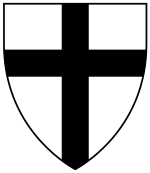This article needs additional citations for verification. (April 2024) |
| Order of Brothers of the German House of Saint Mary in Jerusalem | |
|---|---|
 The coat of arms in the style of the 14th century | |
| Active | c. 1190 – present |
| Allegiance | (c. 1190 – present) (1945–present) (1949–present) (1993–present) Historical
|
| Type | Catholic religious order (1192–1810 as military order) |
| Headquarters |
|
| Nickname(s) | Teutonic Knights, German Order |
| Patron | |
| Attire | White mantle with a black cross |
| Commanders | |
| First Grand Master | Heinrich Walpot von Bassenheim |
| Current Grand Master | Frank Bayard[1] |
The Teutonic Order is a Catholic religious institution founded as a military society c. 1190 in Acre, Kingdom of Jerusalem. The Order of Brothers of the German House of Saint Mary in Jerusalem was formed to aid Christians on their pilgrimages to the Holy Land and to establish hospitals. Its members have commonly been known as the Teutonic Knights, having historically served as a crusading military order for supporting Catholic rule in the Holy Land and the Northern Crusades during the Middle Ages, as well as supplying military protection for Catholics in Eastern Europe.
Purely religious since 1810, the Teutonic Order still confers limited honorary knighthoods.[2] The Bailiwick of Utrecht of the Teutonic Order, a Protestant chivalric order, is descended from the same medieval military order and also continues to award knighthoods and perform charitable work.[3]
- ^ "Deutscher Orden: Brüder und Schwestern vom Deutschen Haus St. Mariens in Jerusalem". www.deutscher-orden.at.
- ^ Redazione. "La Santa Sede e gli Ordini Cavallereschi: doverosi chiarimenti (Seconda parte)".
- ^ Riley-Smith, Jonathan Simon Christopher (1999). The Oxford History of the Crusades. Oxford University Press. ISBN 978-0192853646.
Teutonic knights are still to be found only in another interesting survival, Ridderlijke Duitse Orde Balije van Utrecht (The Bailiwick of Utrecht of the Teutonic Order). Like the Hospitaller Bailiwick of Brandenburg, this commandery turned itself into a noble Protestant confraternity at the time of the Reformation.